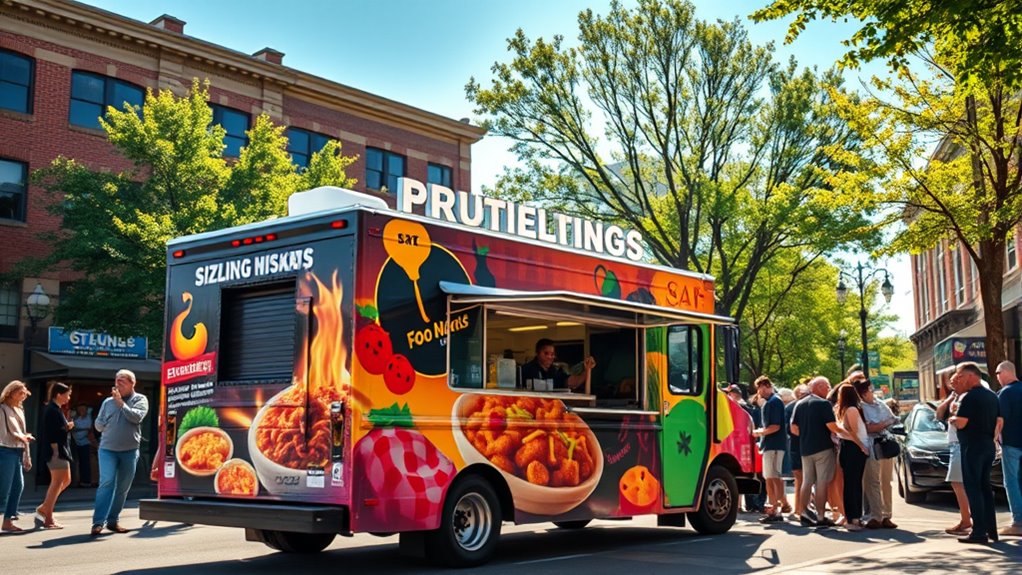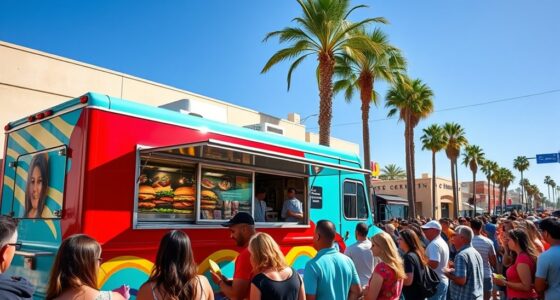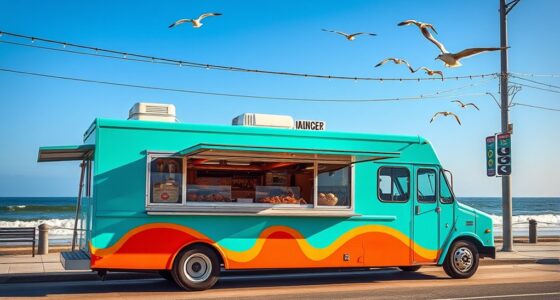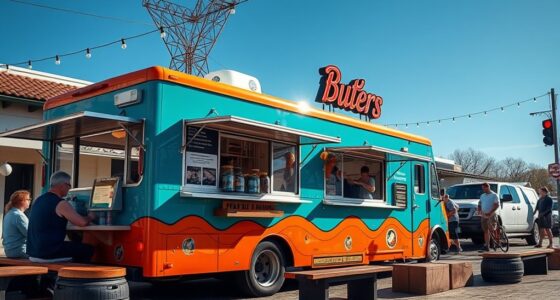To start a food truck in Fort Wayne, IN, you’ll need to understand local regulations, including permits and health standards. Set up your operations by choosing a licensed shared kitchen and designing an efficient workspace. Develop a regional-inspired menu, plan your finances, and get insurance. Use technology to streamline sales and inventory. Build your presence at local events and festivals to attract customers. Keeping these steps in mind will help you succeed — more details await as you continue.
Key Takeaways
- Complete online food truck permits and licenses through Fort Wayne’s official permit application portal.
- Ensure compliance with local health and sanitation standards by passing inspections at a licensed shared kitchen.
- Develop a menu highlighting regional Indiana ingredients and implement dynamic pricing strategies for profitability.
- Participate in local festivals, farmers markets, and community events to boost visibility and attract diverse customers.
- Utilize technology like mobile POS systems and social media marketing to streamline operations and build customer loyalty.
Food Truck Industry Overview
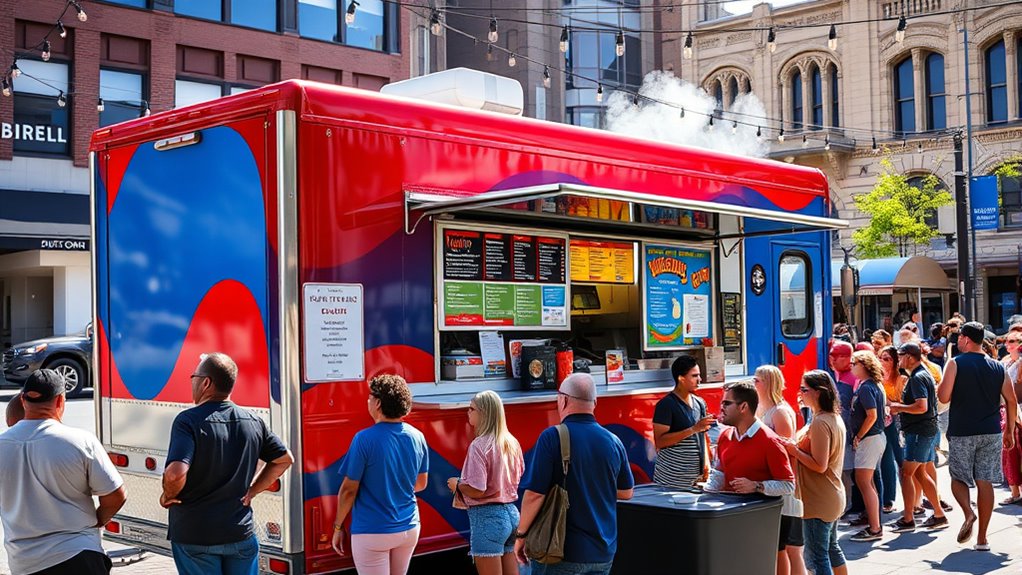
The food truck industry has experienced rapid growth over the past decade, transforming from a niche market into a mainstream culinary trend. As a new food truck operator, you’ll find that effective food truck branding is essential for standing out in a crowded market. Your brand helps attract customers and creates a memorable impression. Customer engagement plays a vital role in building loyalty—interacting with your audience through social media, promotions, or friendly service encourages repeat visits. The industry thrives on innovation and flexibility, allowing you to adapt menus and marketing strategies quickly. By focusing on strong branding and engaging with your customers, you’ll be well-positioned to grow your presence and succeed in Fort Wayne’s vibrant food scene. Additionally, understanding the importance of grocery savings strategies can help you optimize your supply chain and reduce operational costs.
Understanding Local Requirements
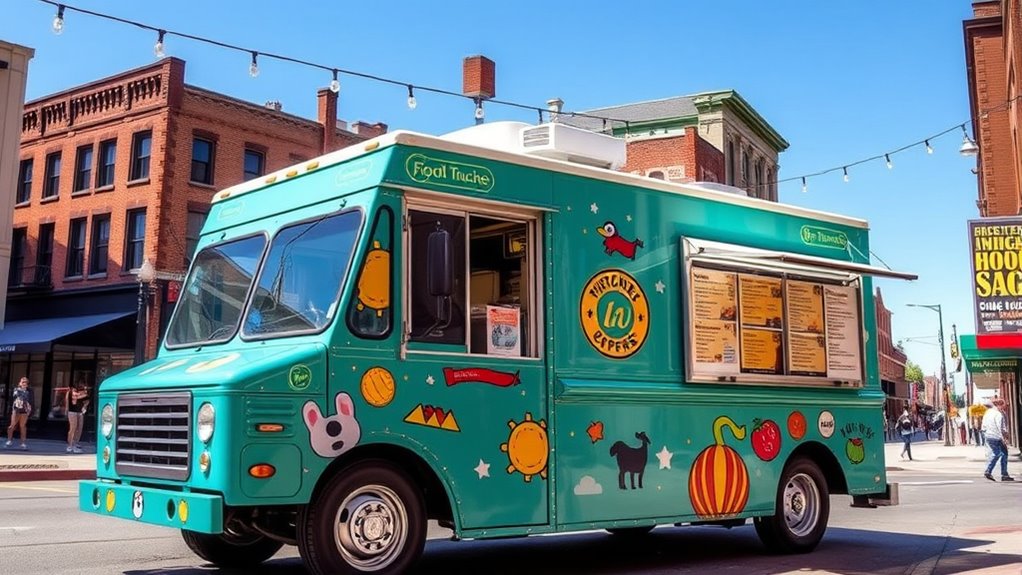
To operate a food truck in Fort Wayne, you need to start with the online permit application portal to guarantee all paperwork is in order. You must also meet sanitation standards and prepare for audit tips to pass health inspections smoothly. Additionally, familiarize yourself with designated truck parking zones to avoid violations and stay compliant with local regulations. Remember that understanding local regulations is crucial for long-term success in your food truck venture.
Online Permit Application Portal
Getting around Fort Wayne’s online permit application portal is a straightforward way to meet local food truck requirements. The permit portal simplifies the application process, allowing you to submit necessary documentation quickly. To get started, you’ll need to create an account and gather all relevant information about your truck and menu. The portal guides you step-by-step, ensuring you don’t miss any critical details. Keep in mind that some permits may require additional approvals or fees, which are clearly indicated on the platform. By using the permit portal, you can track your application’s progress and receive notifications, saving you time and effort. Familiarizing yourself with the portal’s features will make the process smoother and help you stay on top of all local requirements.
Sanitation Standards and Audit Tips
After setting up your online permit application, it’s important to understand and meet Fort Wayne’s sanitation standards to guarantee your food truck remains compliant. Regular health inspections ensure your truck maintains proper cleanliness protocols. To pass inspections, prioritize sanitation practices like proper food storage, thorough cleaning, and pest control. Keep detailed records of cleaning schedules and maintenance routines. Remember, consistent cleanliness boosts customer confidence and prevents violations.
| Key Point | Action Item |
|---|---|
| Food Storage | Use sealed containers and separate raw from cooked items |
| Surface Cleaning | Sanitize prep surfaces after each use |
| Pest Control | Schedule routine pest inspections |
| Personal Hygiene | Wash hands regularly and wear clean uniforms |
| Record Keeping | Maintain logs of cleaning and inspection routines |
Designated Truck Parking Zones
Understanding Fort Wayne’s designated truck parking zones is essential to keeping your food truck compliant with local regulations. Parking regulations specify where you can legally park your truck, and zone enforcement guarantees these rules are enforced consistently. Knowing these zones helps you avoid fines and penalties, ensuring smooth operation. Fort Wayne designates specific areas for food trucks, often near high-traffic zones or events. Be aware of restrictions that may limit parking duration or require permits. Failing to park in approved zones can lead to citations or even towing. To stay compliant, familiarize yourself with the local signage and zone boundaries. This knowledge helps you plan your route and parking strategy effectively, keeping your business running smoothly and within legal boundaries.
Setting Up Your Base of Operations
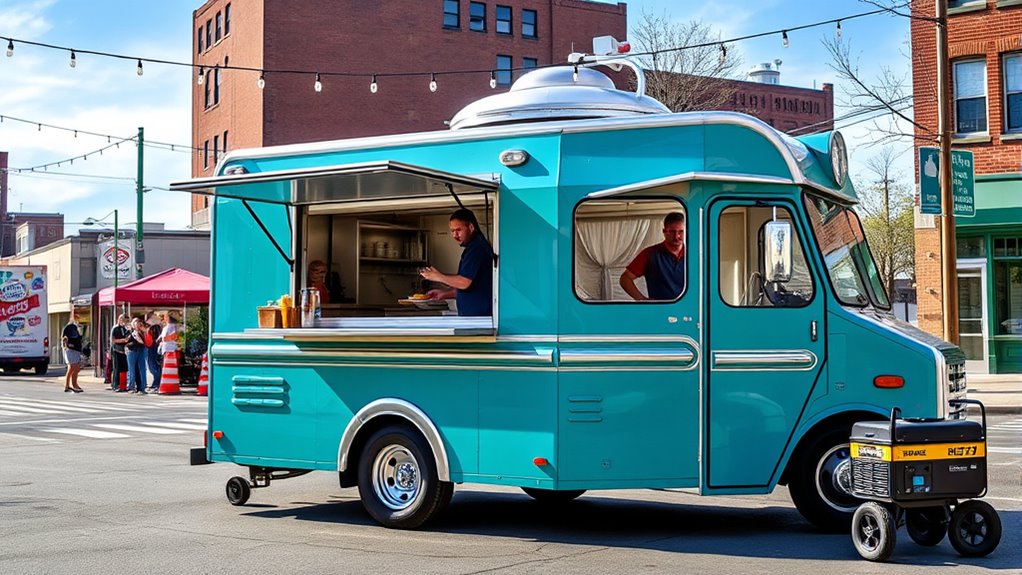
When setting up your base of operations, you’ll need to ensure shared kitchen licensing requirements to consider you’re compliant. Designing a custom kitchen layout can help maximize efficiency and meet health standards. Taking these steps early will set a solid foundation for your food truck business in Fort Wayne. Incorporating diverse and functional kitchen designs can further enhance your operational workflow and compliance efforts.
Shared Kitchen Licensing Requirements
Setting up your food truck in Fort Wayne requires obtaining the appropriate shared kitchen license, which serves as your base of operations. This license guarantees your kitchen meets local regulations and health inspection requirements. To qualify, you’ll need to find a licensed shared kitchen that complies with health standards and maintains proper sanitation. The shared kitchen licensing process involves submitting documentation, passing health inspections, and demonstrating food safety protocols.
Key points to consider include:
- Guaranteeing the shared kitchen has valid licensing and permits
- Meeting all health inspection requirements for cleanliness and safety
- Maintaining proper storage and food handling practices
Securing a shared kitchen license is essential for legal operation and building customer trust in Fort Wayne’s vibrant food scene.
Custom Kitchen Layout Considerations
Designing your kitchen layout carefully guarantees your food truck operates efficiently and complies with health standards. When planning your custom kitchen, consider layout considerations that maximize space and workflow. Think about where to position your cooking equipment, prep stations, and refrigeration to prevent cross-contamination. Adequate storage must be integrated without cluttering work areas. Accessibility is key; ensure all stations are reachable and ergonomic. Ventilation, fire safety, and sanitation areas should be prioritized in your layout considerations. Remember, a well-designed custom kitchen not only boosts productivity but also ensures smooth daily operations and compliance with health regulations. Take your time to plan each detail, and tailor your layout to your specific menu and workflow needs.
Budgeting and Financing Your Food Truck
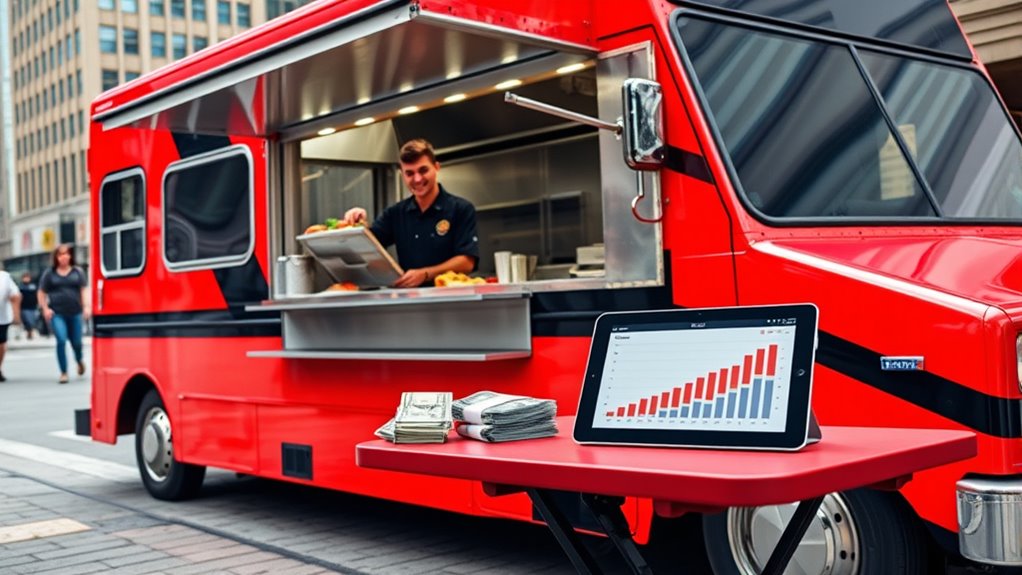
Getting your food truck off the ground starts with understanding your initial costs, including equipment, permits, and licensing fees. You should also explore local small business grants that can help ease financial pressure. Additionally, planning for liability coverage and keeping track of tax deadlines will keep your business compliant and protected. To minimize risks associated with payment processing, consider researching merchant services options that best suit your needs.
Initial Investment Breakdown
Are you prepared to estimate how much it will cost to launch your food truck? The initial investment covers essential expenses like purchasing the truck, outfitting it with kitchen equipment, and initial ingredient sourcing. Don’t forget to budget for staff training, ensuring your team can operate efficiently and uphold safety standards. To get a clear picture, consider these key areas:
- Costs of buying and customizing the food truck
- Equipment and supplies for cooking and serving
- Initial inventory and ingredient sourcing
Understanding these costs helps you plan for financing and prevent surprises down the line. Properly allocating funds for staff training ensures your team is prepared from day one, leading to smoother operations and happier customers. A detailed breakdown keeps your startup on track financially.
Local Small Business Grants
Securing local small business grants can considerably ease the financial burden of launching your food truck. Fort Wayne offers various local grant programs designed to support small business funding, making it easier to cover startup costs. These grants often target entrepreneurs like you who want to grow their food business in the community. To find suitable options, research city and county websites, as well as local economic development agencies. Keep in mind that grant applications typically require a solid business plan, financial statements, and proof of community impact. While grants don’t have to be repaid, competition can be fierce, so prepare thoroughly. Taking advantage of local grant programs can provide essential capital, helping you get your food truck up and running faster and with less financial stress.
Liability Coverage and Tax Deadlines
Understanding liability coverage and staying on top of tax deadlines are vital steps in budgeting and financing your food truck. Liability coverage protects you from potential claims, making sure your business can handle accidents or damages without financial ruin. Missing tax deadlines can lead to penalties or interest charges, so it’s imperative to stay organized. To manage these effectively, consider the following:
- Regularly review your liability coverage to ensure it matches your business activities
- Mark all relevant tax deadlines on a calendar and set reminders
- Keep detailed records of expenses and income for smooth tax filing
Designing Your Menu and Pricing Strategy
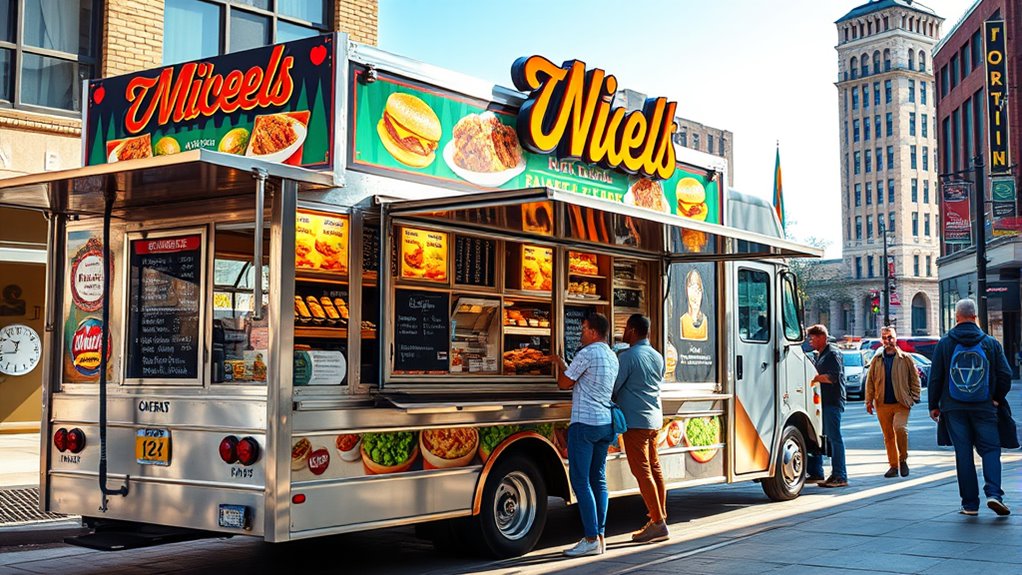
When designing your menu, consider creating unique dish pairings that highlight regional flavors to attract local customers. Implement a dynamic pricing strategy that adjusts based on demand to maximize profits and keep your offerings competitive. By focusing on these points, you can craft a menu that appeals to your audience while optimizing your pricing approach. Additionally, understanding paint preparation and application techniques can help you develop visually appealing and high-quality offerings that stand out.
Unique Dish Pairings for Regional Flavors
To create a menu that truly highlights regional flavors, you need to focus on unique dish pairings that complement local ingredients and culinary traditions. Thoughtful dish pairings can elevate the regional flavor experience, making your menu memorable. For example, pairing locally smoked meats with seasonal vegetables showcases Indiana’s farm-to-table spirit. Incorporate regional flavors by combining ingredients like sweet corn, tender pork, or hearty potatoes in your dish pairings. These combinations not only attract local customers but also stand out to tourists enthusiastic to taste authentic Fort Wayne cuisine. To deepen this connection, consider:
- Pairing Indiana-made cheeses with regional craft beers
- Combining sweet corn fritters with local honey drizzle
- Serving tender pork belly with apple cider glazes
These dish pairings bring regional flavor to life, enticing customers with every bite.
Dynamic Pricing Based on Demand
Implementing dynamic pricing based on demand allows you to optimize your food truck’s revenue and better serve your customers. With demand-based pricing, you can adjust your menu prices in real-time, depending on peak hours, special events, or slow days. This flexibility guarantees you’re capturing more value when demand is high and attracting customers with competitive prices when demand drops. Use data from sales patterns and customer flow to set your prices strategically. Dynamic pricing encourages customers to visit during off-peak times, balancing your workload and maximizing profit. By employing demand-based pricing, you stay adaptable and responsive, making your pricing strategy more effective and aligned with customer behavior. It’s a smart way to boost revenue while maintaining customer satisfaction.
Technology and Operations
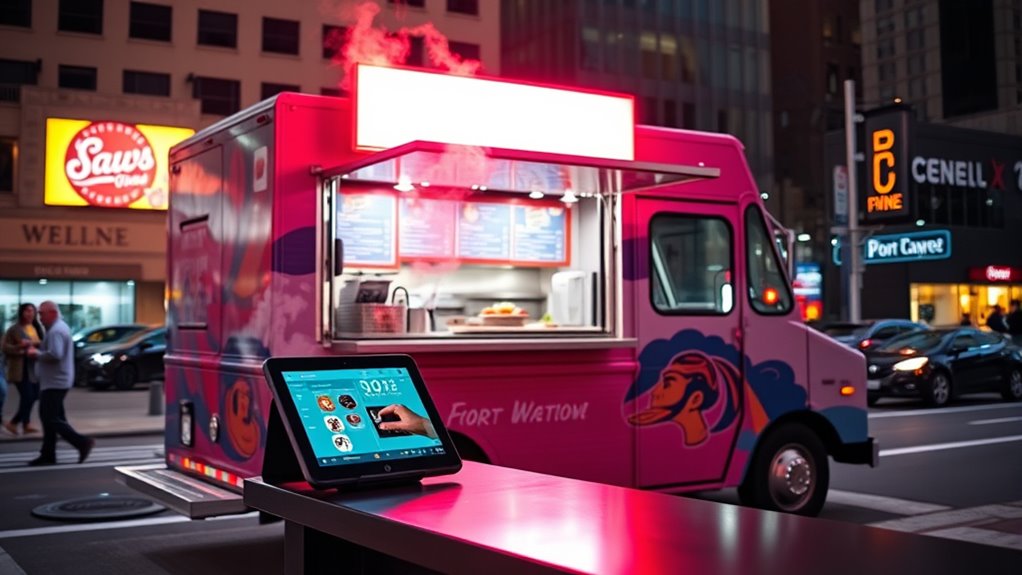
Using wireless card readers and apps can streamline your transactions and reduce wait times. Mobile POS systems and stock apps help you keep track of inventory and sales in real-time. Incorporating these tools guarantees your food truck runs smoothly and stays organized on busy days.
Wireless Card Readers and Apps
Wireless card readers and apps have revolutionized how food trucks handle transactions, making payments faster and more secure. With digital payments and contactless transactions, you can serve customers quickly without cash or swiping. These devices connect seamlessly to smartphones or tablets, streamlining checkout processes and reducing wait times. Plus, they enhance security by encrypting payment data, protecting both you and your customers. To get started, consider these key features:
- Compatibility with multiple payment types and contactless options
- Easy integration with existing POS systems
- Real-time transaction tracking and reporting
Mobile POS and Stock Apps
Mobile POS and stock apps streamline your food truck’s operations by providing real-time sales tracking, inventory management, and order processing right from your smartphone or tablet. These tools help you stay organized, reduce waste, and ensure efficient service. With digital marketing features integrated into some apps, you can easily promote specials or loyalty programs, encouraging repeat business. Managing stock levels becomes simpler, preventing shortages and overstocking. Plus, these apps enable you to analyze sales data to identify popular items and optimize your menu. By fostering customer loyalty through streamlined service and targeted marketing, you create a better experience that keeps customers coming back. Overall, mobile POS and stock apps are essential for running a modern, efficient food truck in Fort Wayne.
Marketing and Growing Your Presence
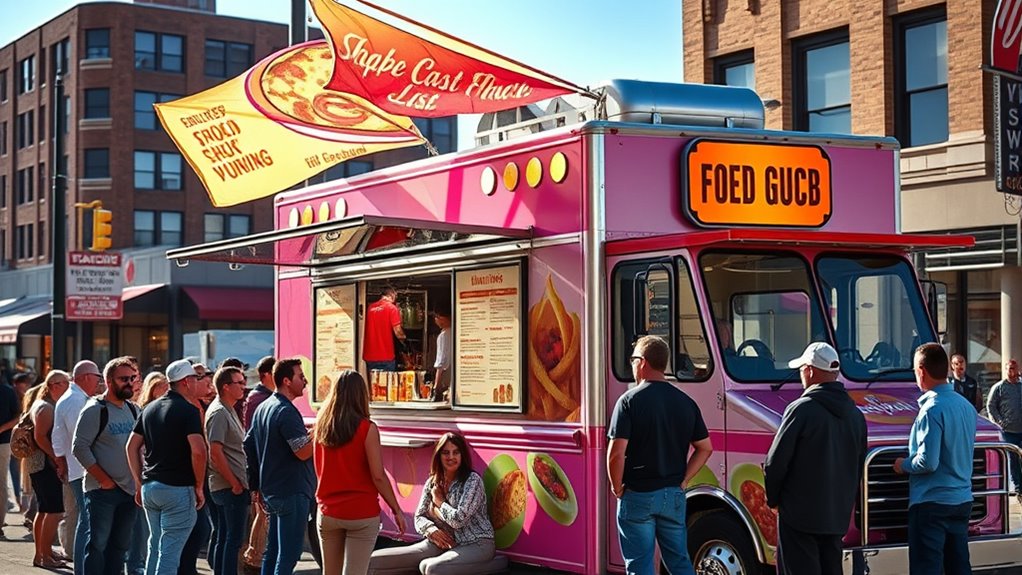
To boost your visibility in Fort Wayne, make sure to align your schedule with popular local events and festivals. These gatherings attract large crowds enthusiastic to try new foods, giving you a prime opportunity to grow your customer base. Targeting these festivals can be a game-changer for expanding your food truck’s presence in the community.
Popular Local Event Schedules
Participating in popular local events is one of the most effective ways to boost your food truck’s visibility in Fort Wayne. By aligning your schedule with key food truck festivals and regional food trends, you can attract new customers and build a loyal following. These events often draw large crowds enthusiastic to try diverse cuisines, making them perfect opportunities for exposure. Check local event calendars to identify upcoming festivals, farmers markets, and street fairs. Planning your presence during peak times ensures maximum foot traffic. Additionally, engaging with event organizers can help you secure prime spots that increase your chances of standing out. Staying consistent with popular local event schedules helps establish your reputation as a reliable and exciting food option in Fort Wayne.
Targeting Local Food Festivals
Targeting local food festivals is a powerful way to grow your food truck’s presence in Fort Wayne. When participating, focus on your food truck design to attract attention and reflect your brand’s personality. A visually appealing setup draws in crowds and encourages people to stop by. Engaging with customers during festivals is key—ask for feedback, share your story, and create a memorable experience. This boosts customer engagement, turning first-time visitors into loyal fans. Additionally, use these events to showcase your menu’s best offerings and offer promotional deals. Building relationships at festivals helps spread word-of-mouth, expanding your reach in Fort Wayne’s vibrant food scene. Consistent presence and authentic interactions make your food truck a local favorite.
Navigating Fort Wayne’s Food Scene
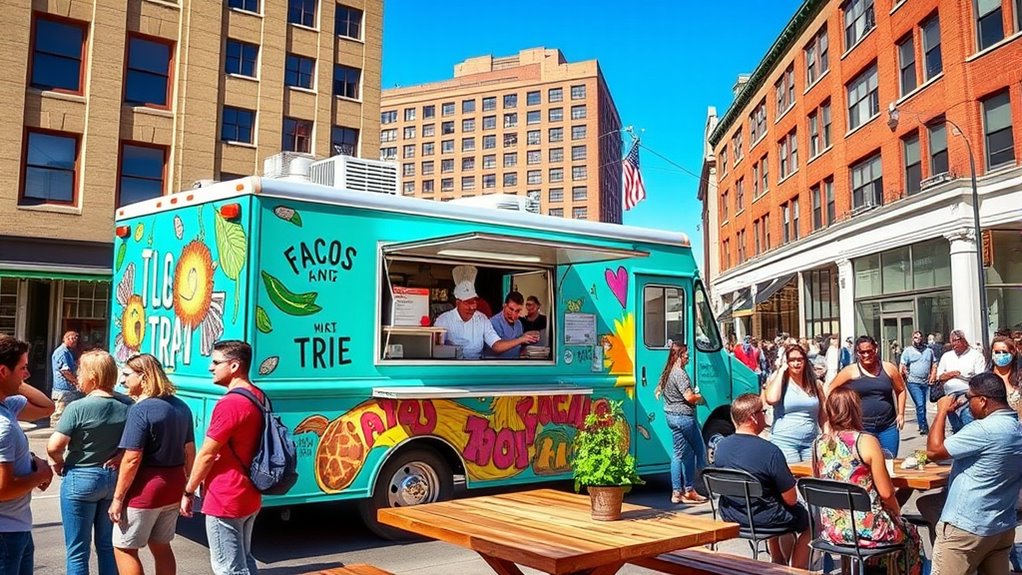
Exploring Fort Wayne’s food scene is an exciting adventure, especially with its vibrant mix of local eateries, food trucks, and hidden gems. To succeed, you need to understand current trends, like the focus on local food trends and regional ingredient sourcing. These elements influence what customers seek and help your truck stand out. Familiarize yourself with popular neighborhoods and events where food trucks thrive. Building relationships with local farmers and suppliers ensures fresh ingredients and supports community sustainability. Keep an eye on social media and local publications for new openings and trending flavors. By staying informed and connected, you’ll navigate Fort Wayne’s dynamic food scene confidently and create a menu that resonates with both locals and visitors.
Frequently Asked Questions
What Permits Are Required to Operate a Food Truck in Fort Wayne?
To operate a food truck in Fort Wayne, you need to obtain vendor licensing and meet food safety regulations. You must apply for a vendor permit through the local health department and verify your truck passes health inspections. Additionally, you’ll need a business license from the city and adhere to food safety standards. Staying compliant with these requirements helps you run your food truck legally and safely.
How Do I Choose the Best Location for My Food Truck?
They say, “location is everything,” and it’s true for your food truck. To choose the best spot, consider parking regulations and look for high customer foot traffic. Find areas with limited restrictions, easy accessibility, and nearby workplaces or events. Test different locations to see where you attract the most customers, and always stay updated on local rules to avoid fines. Your success depends on smart placement.
What Are Common Challenges Faced by Food Truck Owners in Fort Wayne?
You’ll face challenges like seasonal fluctuations, which can impact your sales during colder months, and maneuvering parking regulations that vary across Fort Wayne. Finding consistent, legal spots to park your food truck requires research and flexibility. You might also encounter competition and managing your business expenses. Staying adaptable and informed about local rules helps you overcome these hurdles, ensuring your food truck stays successful year-round.
How Can I Differentiate My Food Truck From Competitors Locally?
To stand out locally, focus on creative branding that captures your food truck’s personality and draws attention. Develop a unique menu with signature dishes or innovative flavors that appeal to your target audience. Use eye-catching visuals, memorable logos, and consistent messaging across social media. Engaging storytelling about your food and passion will also help differentiate your truck, creating a loyal customer base enthusiastic to try your distinctive offerings.
What Are the Most Popular Cuisine Types for Fort Wayne Food Trucks?
You find that fusion cuisine and vegan options are among the most popular for Fort Wayne food trucks. Customers love innovative dishes blending flavors from different cultures and appreciate plant-based choices for their health and sustainability. To stand out, offer unique fusion menus and clearly highlight vegan options, catering to diverse tastes. Engaging with local food trends and emphasizing quality can attract more loyal customers to your food truck.
Conclusion
Starting a food truck in Fort Wayne can be a rewarding journey if you plan carefully and stay adaptable. Remember, Rome wasn’t built in a day, so be patient and persistent. Focus on your unique offerings, connect with the community, and keep refining your approach. With passion and dedication, you’ll turn your food truck dream into a thriving reality. Stay committed—success often comes to those who keep moving forward.
